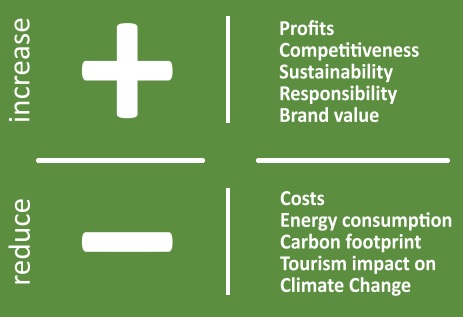Energy Efficiency delivers Profit equivalent to ADR Increase
The importance of Energy Efficiency and Sustainability in the Hotel Industry
It is documented that every 10% reduction in energy consumption has the same financial effect as increasing your average daily room rate (ADR) by $0.62 to $1.35.
The hospitality sector is one of the most energy-intensive and rising energy costs are driving owners/operators, as well as larger corporations, to actively seek energy efficiency.
In fact, energy represents the single fastest-growing operating cost in the lodging industry. There is a well-established case for energy efficiency as a sound business practice, and expectations for hoteliers to demonstrate their climate stewardship are growing.

Hotels use more energy per square meter than any other buildings and Improved operating income translates to higher asset value for owners. Cost reductions through energy efficiency are quantifiable and can be described using key financial metrics, such as revenue per available room (RevPAR) or the equivalent increase to the Average Daily Rate (ADR).
In the hotel sector, reducing energy costs while continuing to meet the diverse needs of guests, owners, and corporate requirements is challenging but achievable. Energy efficiency provides hotel owners and operators cost savings that benefit the bottom line while it improves the service of capital equipment, enhances guest comfort, and demonstrates a commitment to climate stewardship. Environmental friendliness can be a market strength for a hotel brand, which can lead to a better reputation among consumers.
It is documented that every 10% reduction in energy consumption has the same financial effect as increasing your average daily room rate (ADR) by $0.62 to $1.35.

